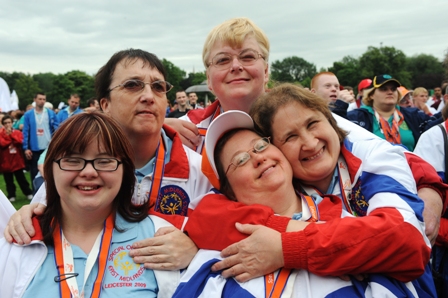
Special Olympians applying the Usain Bolt principle of smiling
Edition number 23; dateline 1 September 2009
For the sheer joy of it
To paraphrase the noted Australian philosopher H G Nelson, it has been a summer when too much sport was barely enough. Inspired by a tumult of tennis, a crescendo of cricket and a surfeit of cycling, the TLR team has gone the extra mile to produce a bumper issue to see the sport, leisure and culture sector safely through September. With the nation apparently taking to the sun lounger en masse during August, there is the lingering feel of the holiday season with several correspondents filing their copy from their holiday locations to ensure the immediacy of their reports. Refreshed and renewed by the whiff of the factor thirty, we have also brought some new features to The Leisure Review, which we hope you will find of interest.
Everyone will have their own highlights of the summer and mine included Stuart Broad saying he will not be carrying on like Becks in pursuit of money (let’s have a whip-round and test his reserve; we’ve all got our price and I suspect a five-figure sum would have him down to his undercrackers quick enough). There was also a shadow home secretary who had confidently stated that Britain is just like The Wire. He had to to wait several minutes before being shown to be a total cretin (it transpired he had seen at least one or two of the first series, more than enough, he felt, to render him an expert on McNutty’s epiphany, the Bunk’s dance moves and how it tales of West Baltimore ties up nicely into an easy summer sound bite). Top of the shop, however, was the story of James Cracknell and Rebecca Romero attempting to break the mixed tandem end-to-end, which, translated from cycling geek-speak, refers to the record for a man and woman pedalling a tandem from Land’s End to John O’Groats.
Anyone who saw Romero interviewed in Beijing will have been left in no doubt as to the depths of intensity that this multiply medalled Olympian is able to plumb in pursuit of her goals; and anyone who saw the Sunday night television series that told the story of a team of three men heading towards some pole or other will have been able to form their own view on the extent to which she was likely to gel with James Cracknell. Viewers saw Cracknell taunt, ignore and condemn his teammates for failing to match his own standards of fitness, commitment and levels of Olympian heroism. We then watched as he made basic mistakes (huge debilitating blisters on day one) that threatened the whole endeavour. We were then able to savour a final bit of sneering (in this case at the companion, a qualified medic, who had been dressing the suppurating wounds on the big man’s feet twice a day to keep him in the race) before Cracknell then had a mental breakdown as he was forced to contemplate the prospect of failure. Back on the bike, my guess is that Cracknell and Romero would be like two peas in a highly focused pod, a super-powered tandem of neediness belting into the darkness to quieten their own personal demons. Had Romero’s knee not exploded under the pressure of expectation, I suspect they would have kept going until they reached the Arctic circle.
Such levels of commitment and achievement are all very admirable and such TV shows offer some insight into what it takes to be successful in sport at the highest levels. However, Posh Blokes on Ice also showed a car crash of blinkered, selfish determination unalloyed by intelligence, foresight or a hint of humility, all of which served to drive another nail into the coffin of the myth that all elite sports people should stand as role models for a nation’s youth. Some can, some could but I will be forever grateful to Usain Bolt for changing the conventional face of competition from the snarling intimidation of machismo and confrontation to the smile and jig of the sheer joy of running as fast as you can, faster than anyone on the planet and all as if no one’s life depended on it.
Which, of course, it didn’t. At about the same time as Usain was winning hearts and medals in Berlin, Martyn Allison was in Leicester witnessing at first hand what sport could and should be. His report from the Special Olympics is a reminder that sport is able to engage at every level, not just on the biggest stages with the biggest prizes. Martyn makes a plea for media coverage of the Special Olympics and surely this is not too much to ask, particularly when several of the broadsheets that largely ignored the event chose to print fulsome obituaries of Eunice Kennedy Shriver, founder of the Special Olympics and sister of Jack, Bobby and Ted, when she died on 11 August at the age of 88. Martyn reminds us that we need to remember what sport is for. It is about the joy of testing oneself and the joy of competing. It is about Usain achieving the impossible and about the girl in the Special Olympics hurrying off to finish last in the next event, both with exactly the same smile.
Jonathan Ives
Editor
letter from the editor
The Leisure Review editorial
